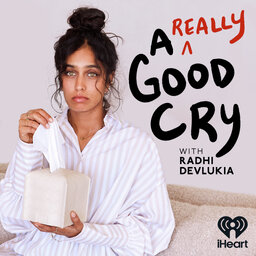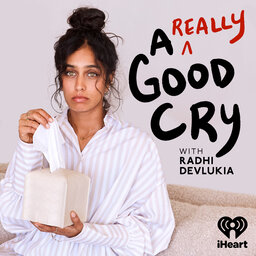Cleo Wade: Toxic Self Talk - A Path to Reclaiming Yourself
Ever feel like anxiety is taking over your life?
Today, I welcome Cleo Wade, an acclaimed poet, author, and speaker known for her profound insights on self-love, mindfulness, and authentic living. Cleo has touched countless lives with her heartfelt words and has authored several best-selling books that inspire readers to embrace their true selves.
In this episode of A Really Good Cry, Cleo and I delve into the transformative journey of overcoming anxiety. We explore the healing power of words, discussing how journaling can be a tool for self-discovery and emotional release. Cleo shares her personal experiences and practical strategies for recognizing anxiety and replacing it with grounded choices.
We also talk about the importance of creating daily rituals that nourish the soul and provide a sense of peace amidst the chaos. From simple practices like mindful breathing to the profound impact of connecting with nature, Cleo offers actionable advice for anyone looking to find calm in their daily lives.
So, find a quiet place, perhaps with a comforting cup of tea, and join me and Cleo for a conversation that promises to inspire and uplift. This episode is a heartfelt journey towards self-acceptance and empowerment that you won't want to miss.
What We Discuss:
- 00:00 Intro
- 00:48 Using words to express yourself
- 07:26 Fear-based decisions
- 09:30 Anxiety is fear
- 11:53 The impact of what we watch and listen to
- 16:40 Adapting self-care to fit your daily routine
- 20:21 Finding your unique path to wellness
- 23:48 How physical activity fuels mental clarity
- 31:11 Being lost and finding yourself
- 36:21 “Acceptance is truly our natural state…”
- 39:56 Understanding pain
- 44:04 Where is negative self-talk coming from?
- 48:53 You are what you watch
- 50:43 Reconnecting with your body and mind
- 57:15 The power of gratitude
- 1:02:47 Watching people fall in love
- 1:06:14 Most difficult emotion to deal with
- 1:09:05 Why we need to cry more often
Follow Cleo:
- https://cleowade.com/
- https://www.instagram.com/cleowade/
- https://www.facebook.com/cleowadeofficial/
Follow Radhi:
In 1 playlist(s)
A Really Good Cry
This podcast won’t solve all your problems, but it WILL go through them with you. Radhi Devlukia bri…Social links
Follow podcast
Recent clips

Dr. Amy Shah On Hormones, Cortisol & Why You’re So Tired
1:00:19

If Life Isn’t Going The Way You Want, Here’s How To Reset
17:49

Naika Opens Up on Music, Identity & Confidence
39:44
 A Really Good Cry
A Really Good Cry